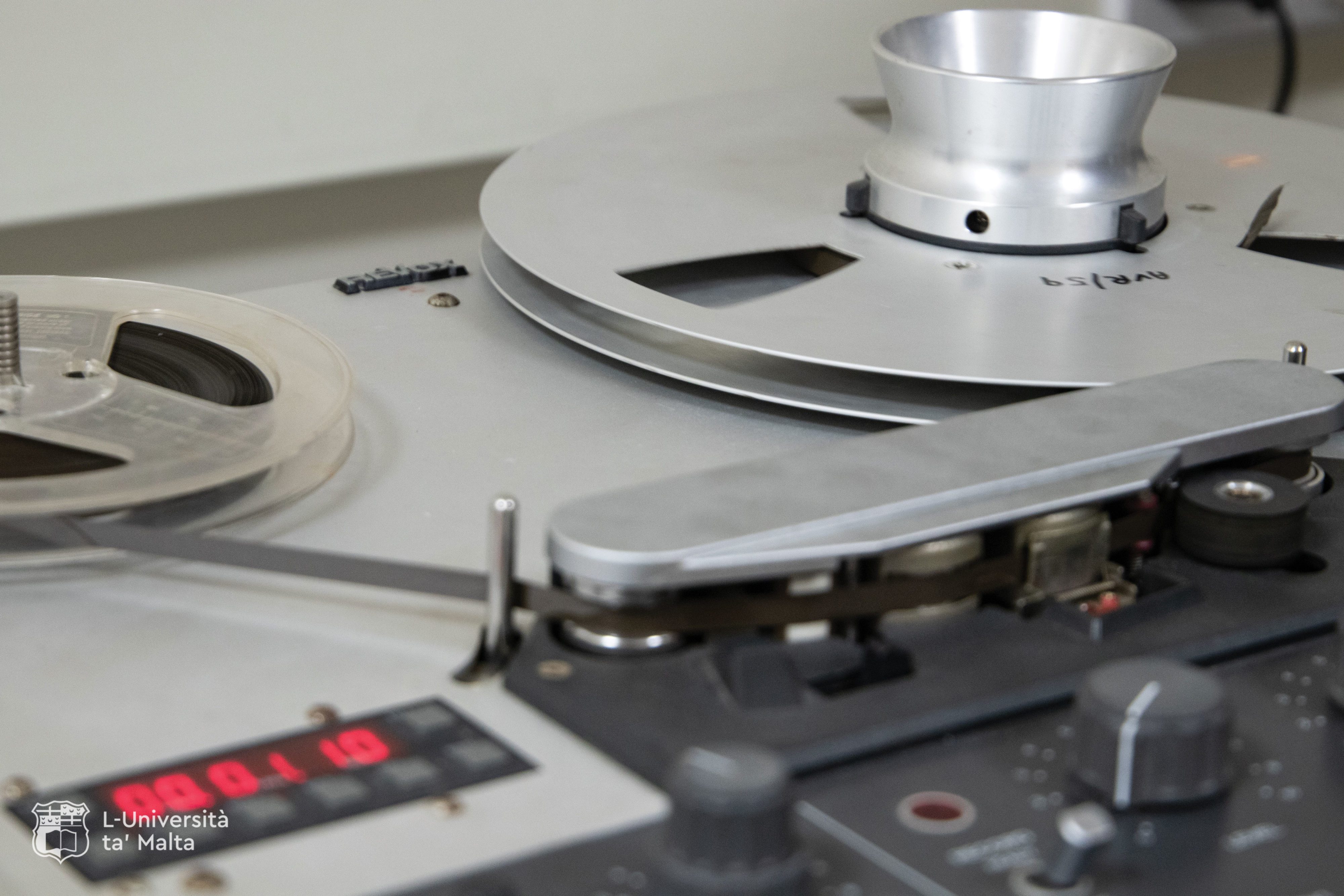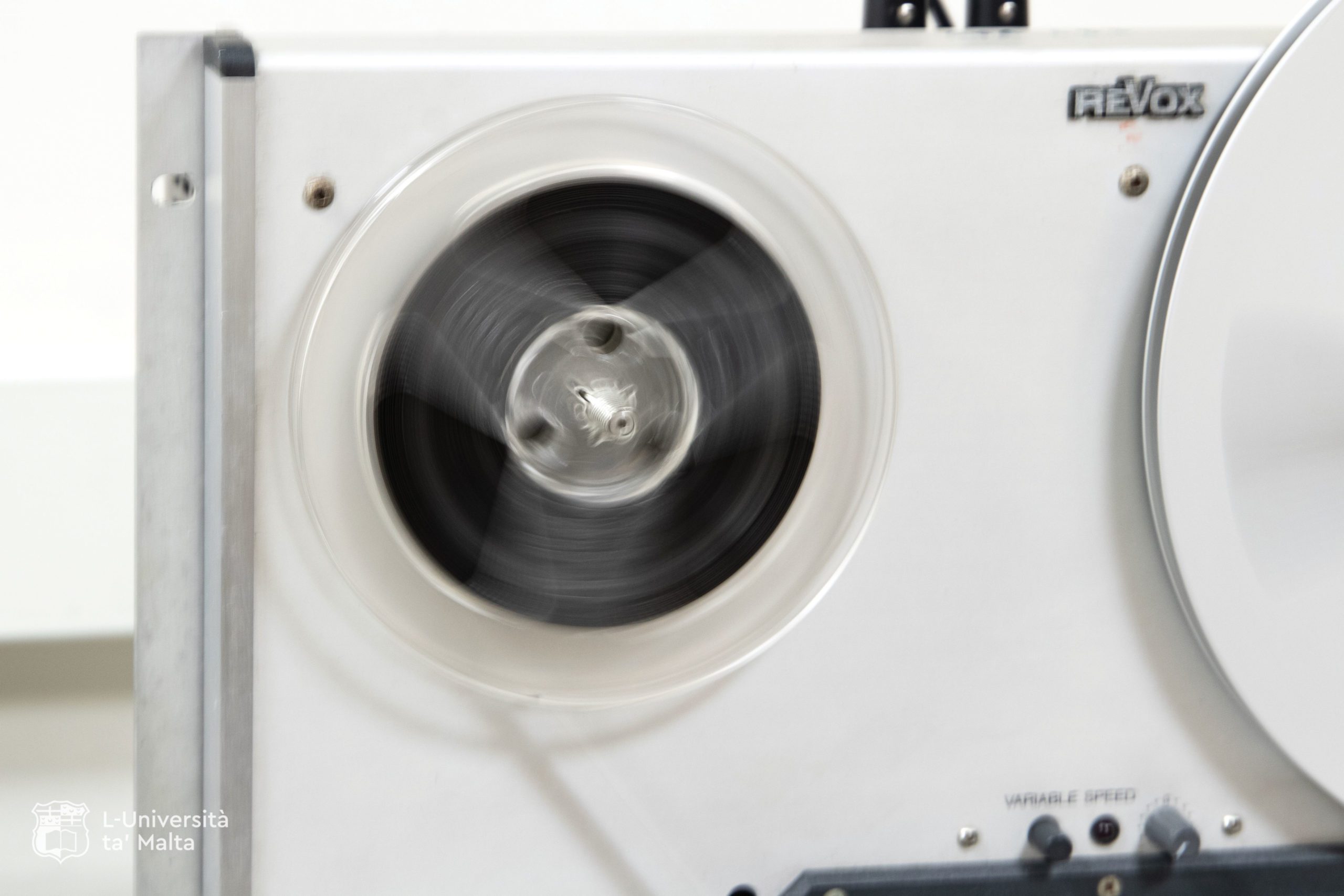To read this article in Maltese, click here.
The way Maltese sounds has evolved over the decades. While written examples of Maltese have survived, records of how it was spoken are much more scarce. However, thanks to the efforts of Prof. Alexandra Vella (UM), Prof. Ray Fabri (UM) and Dr Michael Spagnol, we now have the opportunity to hear firsthand what Maltese sounded like 60 years ago!
Collecting dust: hours upon hours of Maltese heritage, all but a drop in the ocean in an office overflowing with manuscripts. The father of Maltese Linguistics, Prof. Guzé Aquilina, put a lot of effort into these magnetic polyester reels, but they were forgotten and along with them, essential perspectives on our Maltese heritage.
These reels tell quite the story.
Using the magnetic ribbons of polyester in use at the time, Aquilina recorded hours’ worth of dialectal Maltese speech in the 60s and 70s, peppered with different vowels, consonants, and intonations. He did this with the help of his colleague and former Head of Department of Semitic Studies, Benedikt Isserlin from the University of Leeds, who had a special research interest in Arabic dialects. The pair and all those involved immortalised on these reel-to-reels the unique ways locals from different areas in Gozo and Malta spoke. This was done using a reel-to-reel machine feeding from a microphone, which provided an outlet for participants to pour their hearts out. One reel would unwind, and the other would build up, its magnetised strips now hosting disembodied revelations about different Maltese speakers and their language. These recordings, holding approximately 50 hours of content spread across 92 audio files, were all subsequently compiled and results published, highlighting the characteristics of different forms of spoken language – dialects – across the Maltese Islands. Later on in 2015, John Paul Grima based his Bachelor’s dissertation on this rich repository of data, listening to each and every audio file individually, vigilantly documenting the material provided by the speakers and their use of language.
Dialects nowadays are seen as a distinguishing feature of Maltese peoples’ character. They are seen as language spices, but this was not always the case. Dialects, especially rural ones, were previously looked down upon as representing lower class, possibly poorly educated, speakers. It is interesting to note that although this may, for the most part still be the perception of many in Malta, some Gozitans view dialectal spoken language differently, assigning it a more prestigious status.

Aquilina realised that chronicling these irreplaceable pieces of history was a vital means to preserving an important aspect of Malta’s heritage.
Aquilina spoke with the ironsmith hammering his mark into cast iron, speaking to the world of the materials and tools of his trade as he beat, hammered, pierced, roughened up, and smoothed his material. He met the Gozitan lace maker whittling away with her delicate fingers, describing how the final piece had to be starched using flour and sugar to get the desired colour, ensuring the most beautiful result possible. Or the baker producing beautiful freshly baked creations, processed through the help of his invaluable ‘doughers’ — the embodied dough mixers.
Aquilina captured people’s lives in their homes and at their places of work. He simply asked them to speak about their lives in their chosen dialect whilst also eliciting data on their use of dialect. The reel-to-reels he recorded decades ago eventually ended up in Prof. Fr Edward Fenech’s office, who was Head of the Department of Arabic and had been a member of the original team of researchers involved in collecting the dialect data.
These time-capsules do not last forever. Humidity, dust, and voltage differences within the magnetic strips all wear them down. But, a team of researchers from the Institute of Linguistics, Department of Maltese (of which Aquilina was Head) and different departments from the Faculty of Arts, set out on a mission to save these reels. They could not have done this without the technical support from the then University Radio, notably, Anthony Baldacchino.
Baldacchino and the team of technicians raced against time. The physical integrity of the reels needed to be maintained. The reel-to-reel machines slowly started to break down. These voices could not be lost. Directed by Prof. Alexandra Vella, the team set out to make sure that the recordings would be preserved for a much longer time by carrying out the laborious task of digitising and documenting the contents of each and every reel. They transferred the precious data to more modern CDs.
The project has been deemed successful. The recordings are soon going to be made available on the web page dedicated to Maltese dialects on the new portal of the Department of Maltese. These recordings are important for Maltese people’s sense of identity and belonging. They show the richness of dialect articulations across different Maltese and Gozitan localities. This wealth was nearly lost to time and mould. This team has made sure that although some dialects may have changed — or may even no longer be in use — they can still be heard at the click of a button. Thanks to this project, these voices of dialect speakers from the past, will now remind us who Maltese were and have the potential to be.





Comments are closed for this article!